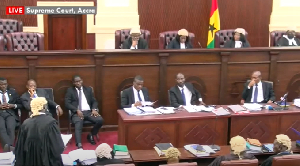Opinions of Thursday, 2 April 2020
Columnist: Dominic Offei
COVID-19 Pandemic: Mr. president, kindly review the lockdown directive
This article seeks to take a critical look at the presidential directive of lockdown as part of efforts to combat the COVID-19 Pandemic. It calls for a review of the directive and suggests some recommendations to ensure an effective lockdown implementation.
Today, 31 March, is the second day of the 14-day lockdown directive announced by the president of Ghana. So far the president of Ghana has shown leadership in this fight against the deadly COVID- 19 Pandemic. I want to commend him for the leadership. and the Information Minister for the regular and constant updates.
Whereas some good news, including that of the Negative results of tests from the Legon issue and that of the Komfo Anokye Teaching Hospital (KATH), as well as the latest news of over 31 new and additional recoveries of COVID-19 patients, I have also observed with utmost worry, and concern, the fallout from the recently announced Presidential lockdown directive at least after day 2.
Ordinarily, I was supposed to be under lockdown, being indoors and still observing my usual social distancing and other hygienic practices such as hand washing and the use of hand sanitizers. Admittedly, I am fully committed to it but I have been forced out of my hibernation to add my voice to the current trending discussions on the partial lockdown of parts of our country.
In this opinion article, I am strongly advocating that per my initial observations, corroborated by numerous media reportage, I believe the president should as a matter of urgency, review the directive for the effective implementation of the lockdown to achieve the desired outcomes.
To say that the president had difficulty in deciding on the lockdown to limit the escalation of the dreadful Covid-19 virus in Ghana will be an understatement. It is one of the difficult decisions for a head of state as it presents a challenge of finding the fine balance between the harsh realities of a lockdown vis-à-vis its socio-economic impacts on the population.
This invariably led the president to make the statement to the point that in implementing our lockdown, we cannot copy blindly, taking into account, our realities. Of course, this means the option left was for us to go for what looks like a partial lockdown or what I call “stay home small but come out small” directive.
In this regard, and to achieve this objective, there were several exceptions announced by the president with many categories of people being allowed to go out under certain conditions. Apart from the frontline health workers, there were some additional exceptions, including those in the food value chain, Security, transport (i.e Trotro and Taxis), and fuel stations.
Significantly, these group, mostly market men and women forms the majority part of the highly informal economy and what it means is that whereas the directive required the majority of people to stay home, the directive has led to a majority of the people rather staying outside, making the directive look somewhat counterproductive at least from where I sit.
The understanding from the presidential directive was that people are supposed to utilize their immediate local markets for their pressing needs. However, it appears it is just as business as usual as many people are exploiting the exception list to with flimsy excuses just to be in town. Some people who were interviewed said they were in town to check and confirm if indeed the lockdown was in force. So ideally whereas the president wanted people to stay home, in reality, people are rather going.
Let me hasten to express that the president's announcement of the 48 hours interval before the lockdown proved to be counterproductive as many people found their way out of the potential lockdown areas to areas where the virus is yet to reach, posing serious threats to these areas. The implementation of the lockdown, at least on this second day is showing similar signs of such loopholes that can eventually defeat the purpose of the directive.
Watching UTV today, I observed, that 2 truckloads, each filled with over 70 persons, mostly women, and children, packed like sardines in very harsh conditions. These are people popularly known as “Kayayes” or headpoters who were attempting to escape from Accra to the Northern part of Ghana in anticipation of the lockdown where they are required to stay in a non-existent “home”. They were eventually stopped by the law enforcement agencies somewhere around Konongo, and were made to return to Accra but quite shockingly, in the same harsh conditions in the same trucks with little regard for social distancing.
Many may argue that inasmuch as the idea of a total lockdown may appear impossible, India and other countries, some in Africa are implementing it as well. Indeed, experts have warned that a poorly managed partial lockdown may make a full-blown lockdown an eventual inevitable option. I may have to agree with many others who believe that the current socio-economic circumstances in Ghana may not support a fulltime lockdown. Indeed some people may actually die before the virus visit them. Nevertheless, I believe an effective implementation of the lockdown albeit partial is not far-fetched.
In this regard, I want to argue that for the effective implementation of the lockdown, the exceptions, which I consider too many and too wide need to be reduced. I am of the opinion that the current numerous exceptions make the lockdown looks optional to the extent that the exceptions cover almost everything else but people who are willing to voluntarily stay at home. Ghanaians should be made to understand that the lockdown is not a pleasant condition to be in, but it should nonetheless be considered to be a form of punishment, but our collective safety and security arrangement.
We should also understand that the virus has no respecter of persons, whether market woman or office person, but what is clear is that its impact can be shared amongst us all, especially if we put our businesses ahead of their health, we may jeopardise our very life. In emergencies, people must be made to understand the essence of staying home.
I believe this could have been better managed by the authorities. At least the authorities should have facilitated for an accommodation facility for these people somewhere close to Kumasi, especially when schools are not in session. Indeed, if the state could sponsor over 1000 persons who arrived at the airport prior to the ban, some of who are non-Ghanaians, in plush hotels in Accra, then it was not impossible to provide at least a dignifying place like a hostel for these people at least in these periods.
Well, not to digress too much, the pandemic has exposed not only our health care system but also our overall social system as well as our transport systems. Whilst the country expected people to stay home, adequate provisions for the homeless was not made, staying Home for these becomes a difficulty if not an impossibility. Could this be the time to consider our social welfare system?
Again, whilst the president expected people to stay at home, trotros, mechanics, vulcanizers, fitters, and others were allowed to operate. The irony is that the trotros cannot move, unless there are passengers and, in a system where they can pick and drop passengers at any point, it becomes difficult to implement the directive of social distancing. Perhaps it is about time we looked at our public transport systems as well.
The implications of a poorly managed lockdown are enormous, and if examples from countries like Italy are anything to go by, then there is a need for serious consideration of its implementation in Ghana. In this conundrum, the question that begs for answers is…. Should the president be bold enough to call for a total lockdown?
Indeed, it may appear difficult to close down your business for two weeks, but it may be more difficult to close a casket of a loved one for an entire lifetime. Kindly STAY HOME.
What are my Recommendations?
I believe with these numerous exceptions, the supposed democratic policing was always going to be a difficulty and I understand the tight situation the police are finding themselves. Whilst they are expected to operate based on the democratic method of policing, people are taking advantage of that directive.













